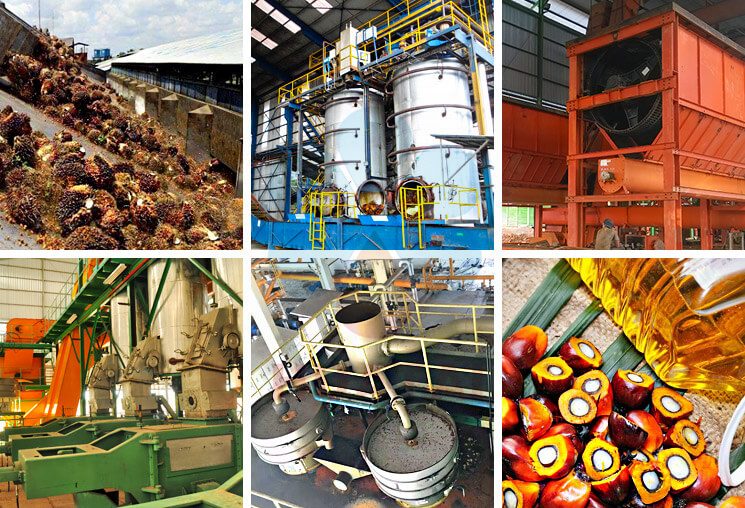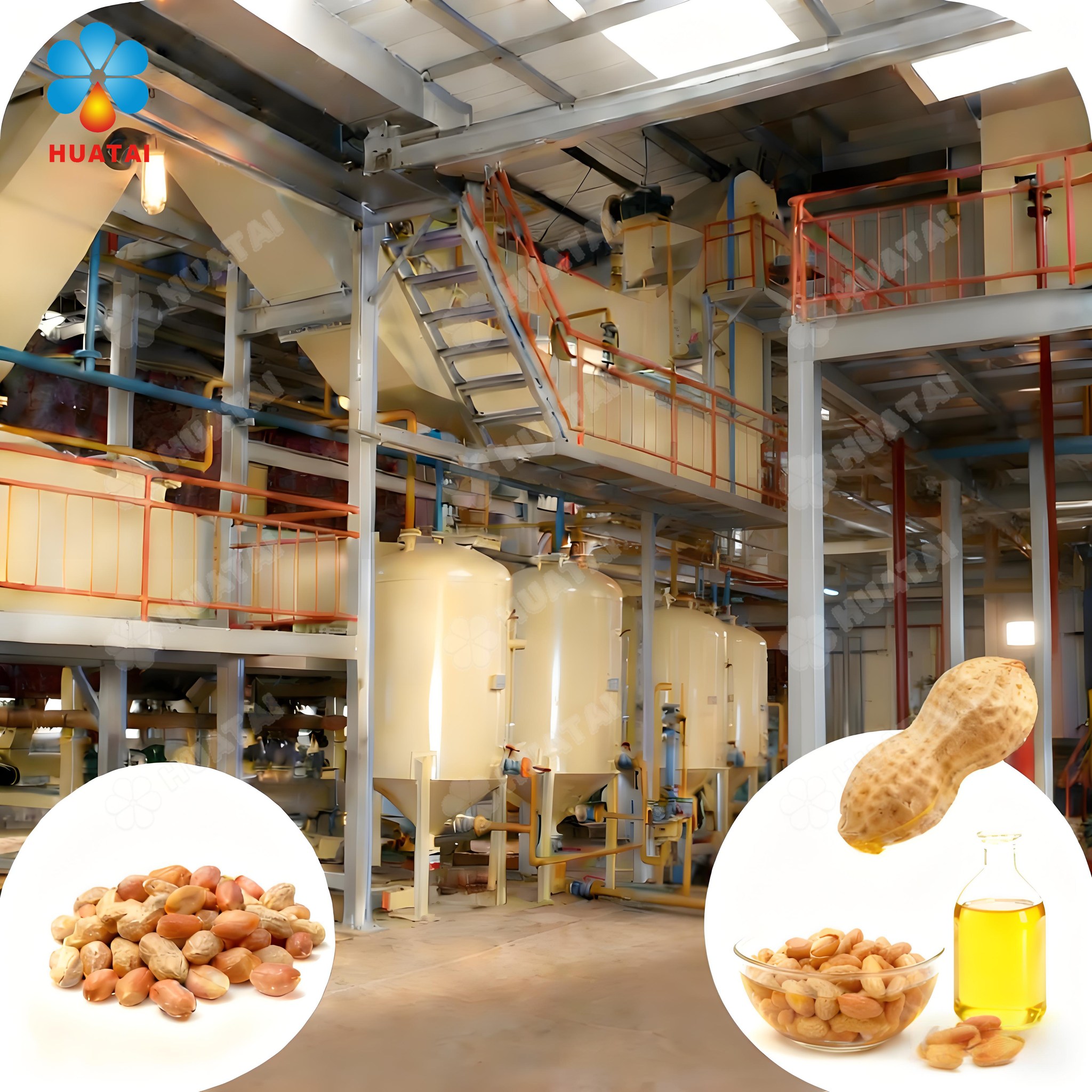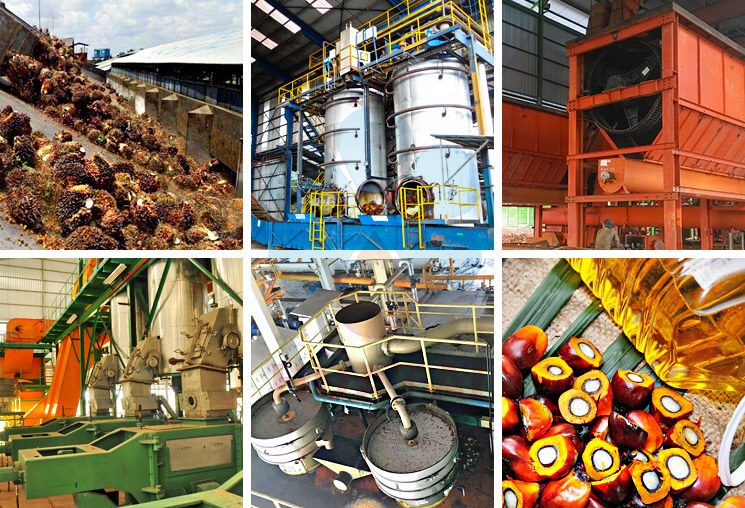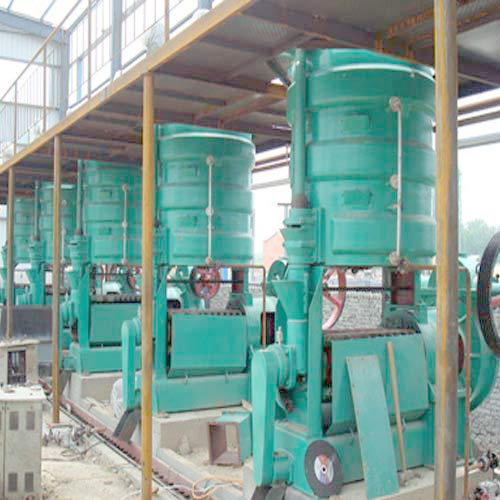Palm oil is the world's largest-producing vegetable oil, widely used in the food, chemical, and bioenergy sectors. If you are planning to invest in or gain a deeper understanding of palm oil production, a systematic grasp of the core knowledge of palm oil mills is crucial. This not only concerns production efficiency but also directly determines return on investment and market competitiveness. As a leading company in the palm oil equipment industry, Henan Huatai Cereals and Oils Machinery Co., Ltd. will combine 37+ years of industry experience to outline the key knowledge you need to understand.
1. The Core of a Palm Oil Mill: Production Process
Understanding a palm oil mill begins with its production process. A modern palm oil mill mainly includes the following key steps:
1) Fresh Palm Fruit Bunches Receiving and Sterilizer: After fresh palm fruit bunches arrive, they need to be weighed and unloaded. They then enter the sterilizer, where they are steamed at high temperatures to kill enzyme activity, soften the pulp, and separate the fruit from the bunch.
2) Threshing: After steaming, the bunches enter a thresher, where rotating and impacting action separates the palm fruit from the bunch.
3) Pressing: The separated palm fruits are pressed in a palm oil screw press to obtain crude palm oil and press cake (containing kernels and fiber).
4) Clarification and Purification: The pressed crude oil contains moisture and solid impurities, requiring clarification and purification through sedimentation, centrifugation, and other processes to obtain pure crude palm oil.
5) Kernel Separation and Kernel Extraction: The press cake is separated to obtain the kernels. After the kernels are crushed, the kernels can be further pressed to extract palm kernel oil.
6) Refining: Crude palm oil and crude palm kernel oil typically contain free fatty acids, pigments, and off-odors, requiring physical or chemical refining processes (degumming, deacidification, decolorization, deodorization) to refine them into various grades of edible finished oils.
Henan Huatai Cereals and Oils Machinery Co., Ltd. provides complete palm oil production line equipment ranging from 10-500 tons per day. Its mature and reliable process design ensures high oil yield and oil quality.

2. Key Aspects of a Palm Oil Mill: Core Equipment Selection
The performance of palm oil equipment directly determines the palm oil mill's capacity, oil yield, and operating costs. When selecting equipment, you need to focus on the following:
1) Sterilizer: This is fundamental to ensuring effective threshing and oil quality.
2) Screw Press: This is the core palm oil pressing equipment; its wear resistance, pressure, and stability are crucial.
3) Clarification, Purification, and Palm Oil Refining Equipment: These determine the grade and value of the final finished oil product.
Henan Huatai Cereals and Oils Machinery Co., Ltd., as a professional grain and oil machinery manufacturer, produces palm oil equipment with the following advantages:
1) High Efficiency and Energy Saving: Utilizing advanced power systems and heat exchange technology, it effectively reduces energy consumption.
2) High Oil Yield: Optimized pressing chamber design and palm oil manufacturing process maximize oil extraction.
3) Stable Operation: Key components use high-strength wear-resistant materials, resulting in low equipment failure rates and long service life.
4) One-stop service: Providing a full range of services from solution design, equipment manufacturing, installation and commissioning to technical training.
3. The Economic Lifeline of a Palm Oil Mill: Oil Yield and Cost Control
Investing in a palm oil mill is fundamentally about economic benefits. You need to understand the following:
1) Oil Yield Calculation: This usually refers to the percentage of crude oil extracted from fresh fruit bunches. Efficient palm oil processing equipment and processes can maintain a high oil yield, which is key to profitability.
2) Cost Structure: This includes raw material costs, energy consumption (water, electricity, steam), labor, equipment depreciation, and maintenance.
3) By-product Value: By-products such as empty fruit bunches, fiber, and shells after pressing can be used as biomass fuel, reducing the mill's energy costs; palm kernel meal is also a high-quality feed ingredient.
Choosing a partner like Huatai Oil Machinery, which can provide high-extraction-rate equipment and comprehensive energy solutions, can significantly improve your return on investment.
4. The Future of Palm Oil Mills: Product Diversification and Refining & Deep Processing
Profit margins for primary crude oil are limited. To remain competitive in the market, product diversification and deep processing are essential.
1) Palm Oil Fractionation: Palm oil is separated into liquid oil (palmitolin) and solid fat (stearin) with different melting points through cooling and crystallization to meet the needs of various food products (such as shortening, margarine, and frying oil).
2) Palm Kernel Oil Applications: Palm kernel oil is an important raw material for manufacturing cosmetics and detergents.
3) Biodiesel: Palm oil is also a high-quality raw material for biodiesel production.
Henan Huatai Cereals and Oils Machinery Co., Ltd. not only provides palm oil pressing equipment but also advanced palm oil fractionation and refining production lines to help customers extend their industrial chain, increase product added value, and seize market opportunities.
5. The Cornerstone of a Palm Oil Mill: Factory Design and Construction
A successful palm oil mill begins with a scientific factory design. This includes:
1) Site Selection: Proximity to raw material production areas, convenient transportation, and sufficient water and electricity supply.
2) Process Layout: A reasonable palm oil equipment layout optimizes material flow and reduces energy consumption and manpower.
3) Environmental Protection and Sustainable Development: Wastewater treatment (POME), waste gas treatment, and solid waste utilization systems must be planned to meet increasingly stringent environmental regulations.
Huatai Oil Machinery's engineering team can provide clients with professional palm oil processing factory layout design and construction guidance, ensuring the project is implemented scientifically, compliantly, and efficiently.
Conclusion
In summary, understanding a palm oil mill is a systematic project involving five core dimensions: process, equipment, economics, products, and design. Choosing an experienced, technically proficient, and comprehensive equipment supplier is the first step to success.
Henan Huatai Cereals and Oils Machinery Co., Ltd., with its strong technical capabilities, mature palm oil production processes, and comprehensive global service system, can provide you with all-round solutions from single equipment to turnkey projects for entire palm oil processing plants. Whether you are new to the industry or planning to upgrade an existing factory, Huatai Oil Machinery will be your trustworthy partner. Contact us to get your customized palm oil mill construction and optimization plan!
Website: https://www.oilpresscn.com/
Email: info06@cnoilmachine.com



